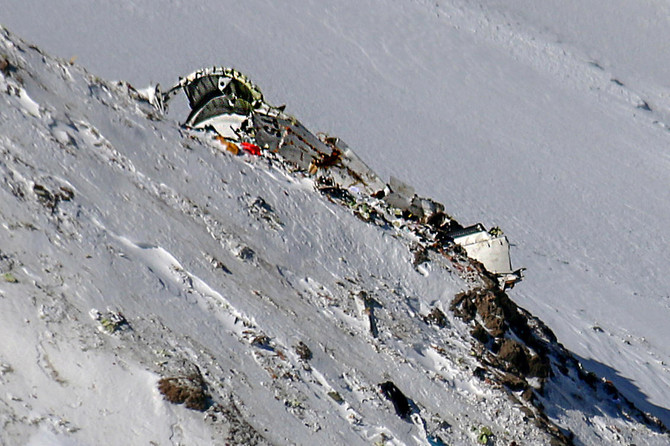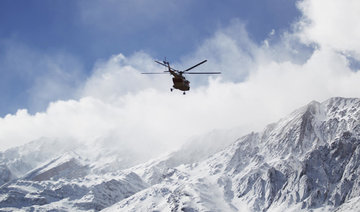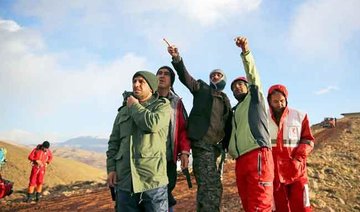BEIRUT: The bodies of seven victims of Sunday’s air crash in Iran were brought down from the mountainous crash site on Wednesday, according to Mizan, the official news site of the Iranian judiciary.
There were no survivors among the 65 passengers and crew on the plane that plowed into a mountaintop in southwest Iran.
The bodies of 32 passengers have so far been found and many of the remaining bodies are buried under ice and snow, state media reported.
“The first team that went to the crash site was able to bring back a few of the bodies of those who lost their lives and deliver them to the medical authorities at the bottom of the mountain a few minutes ago,” Mohsen Momeni, the director of the Isfahan branch of the Red Crescent told the semi-official Mehr news agency on Wednesday.
The black box of the airplane has still not been found local officials told state TV.
The Aseman Airlines plane disappeared from radar screens 50 minutes into Sunday’s flight from Tehran to the southwestern city of Yasuj. The Iranian military located the wreckage in the central province of Isfahan on Tuesday morning.
Glacial temperatures and the mountainous terrain hampered search efforts in recent days, adding to the grief and anger felt by families of the victims in a society plagued by risky air travel where officials blame decades of sanctions for the poor state of national fleet.
The twin-engined turboprop ATR 72 that crashed was more than 24 years old. According to data cited by the Flight Safety Foundation’s aviation-safety.net website, it was restored to service just three months ago after being in storage for six years.
More than 100 people demonstrated on Monday outside a local government office in nearby Dena Kooh county, demanding officials step down for their handling of the disaster after announcements that wreckage had been found on Monday were then denied.
Any individuals whose actions may have led to the crash will be confronted, Mahmoud Vaezi, the head of Iran’s presidency office, said Wednesday, according to Mehr.
Iran has suffered several plane crashes in recent decades. Tehran blames US sanctions for preventing it from importing new aircraft or spare parts.
A Boeing 727 crashed in northwest Iran in 2011, killing 78 people, and in 2009 all 168 people on board died when a Caspian Airlines Tupolev crashed en route for Armenia. In 2003 an Ilyushin-76 troop carrier crashed in southeast Iran, killing all 276 Revolutionary Guard soldiers on board as well as crew.
A deal with world powers on Tehran’s nuclear program in 2015 opened the way for Iranian airlines to update their fleets but many older planes are still in service, particularly on domestic routes.
Bodies recovered from Iran plane crash site
Bodies recovered from Iran plane crash site

Western nations urge Israel to comply with international law in Gaza

- Israel denies blocking humanitarian aid and says it needs to eliminate Hamas for its own protection
- The Western nations said they were opposed to “a full-scale military operation in Rafah” and called on Israel to let humanitarian aid reach the population
ROME: Israel must comply with international law in Gaza and address the devastating humanitarian crisis in the Palestinian enclave, a group of Western nations wrote in a letter to the Israeli government seen by Reuters on Friday.
All countries belonging to the Group of Seven (G7) major democracies, apart from the United States, signed the letter, along with Australia, South Korea, New Zealand, the Netherlands, Denmark, Sweden and Finland.
The five-page letter comes as Israeli forces bear down on the southern Gaza city of Rafah as part of its drive to eradicate Hamas, despite warnings this could result in mass casualties in an area where displaced civilians have found shelter.
“In exerting its right to defend itself, Israel must fully comply with international law, including international humanitarian law,” the letter said, reiterating “outrage” for the Oct. 7 Hamas raid into Israel which triggered the conflict.
Israel denies blocking humanitarian aid and says it needs to eliminate Hamas for its own protection.
The Western nations said they were opposed to “a full-scale military operation in Rafah” and called on Israel to let humanitarian aid reach the population “through all relevant crossing points, including the one in Rafah.”
“According to UN estimates, an intensified military offensive would affect approximately 1.4 million people,” the letter said, underscoring the need “for specific, concrete and measurable steps” to significantly boost the flow of aid.
The letter recognizes Israel made progress in addressing a number of issues, including letting more aid trucks into the Gaza Strip, the reopening of the Erez crossing into northern Gaza and the temporary use of Ashdod port in southern Israel.
But it called on Prime Minister Benjamin Netanyahu’s government to do more, including working toward a “sustainable ceasefire,” facilitating further evacuations and resuming “electricity, water and telecommunication services.”
Since Oct. 7 Israel’s Gaza offensive has killed more than 35,000 Palestinians, local health officials say.
Gaza fighting rages after Israel vows to intensify Rafah offensive

- Fierce battles overnight in and around the Jabalia refugee camp in the north of the war-ravaged Gaza Strip
- Israeli warships launched strikes on Rafah, on the border with Egypt
RAFAH: Fighting raged Friday in Gaza after Israel vowed to intensify its ground offensive in Rafah despite international concerns for the hundreds of thousands of displaced Palestinians in the southern city.
With Gazans facing hunger, the US military said “trucks carrying humanitarian assistance began moving ashore via a temporary pier” it set up to aid Palestinians in the besieged territory.
Witnesses reported fierce battles overnight in and around the Jabalia refugee camp in the north of the war-ravaged Gaza Strip.
Israeli helicopters carried out heavy strikes around Jabalia while army artillery hit homes near Kamal Adwan hospital in the camp, they said.
The bodies of six people were retrieved and several wounded people were evacuated after an air strike targeted a house in Jabalia, Gaza’s Civil Defense agency said.
Rescue teams were trying to recover people from under the rubble of the Shaaban family home on Al-Faluja Street in the camp, it added.
Witnesses said Israeli warships launched strikes on Rafah, on the border with Egypt, where more than 1.4 million Palestinian civilians have been sheltering.
Hamas’s armed wing, the Ezzedine Al-Qassam Brigades, said in a statement that it “targeted enemy forces stationed inside the Rafah border crossing... with mortar shells.”
The war broke out after the October 7 attack on southern Israel which resulted in the deaths of more than 1,170 people, mostly civilians, according to an AFP tally of Israeli official figures.
Out of 252 people taken hostage that day, 128 are still being held inside Gaza, including 38 who the army says are dead.
Israel vowed in response to crush Hamas and launched a military offensive on Gaza, where at least 35,303 people have been killed since the war erupted, according to data provided by the health ministry of Hamas-run territory.
Intensified ground operations
Israel has vowed to “intensify” its ground offensive in Rafah, in defiance of global warnings over the fate of Palestinians sheltering there.
Israel’s top ally the United States has joined other major powers in appealing for it to hold back from a full ground offensive in Rafah.
But Israeli Defense Minister Yoav Gallant on Thursday said “additional forces will enter” the Rafah area and “this activity will intensify.”
Prime Minister Benjamin Netanyahu insisted Thursday that the ground assault on Rafah was a “critical” part of the army’s mission to destroy Hamas and prevent any repetition of the October 7 attack.
“The battle in Rafah is critical... It’s not just the rest of their battalions, it’s also like an oxygen line for them for escape and resupply,” he said.
The Israeli siege of Gaza has brought dire shortages of food as well as safe water, medicines and fuel for its 2.4 million people.
The arrival of occasional aid convoys has slowed to a trickle since Israeli forces took control last week of the Gaza side of the Rafah crossing.
UN denounces ‘intimidation and harassment’ of lawyers in Tunisia

- Civil society in the North African country condemned the arrests as a crackdown on dissent in the country
- The European Union expressed concern this week over the arrests
GENEVA: The United Nations on Friday denounced recent arrests of lawyers in Tunisia, saying the detentions, which have also included journalists and political commentators, undermined the rule of law in the North Africa country.
“Reported raids in the past week on the Tunisia Bar Association undermine the rule of law and violate international standards on the protection of the independence and function of lawyers,” Ravina Shamdasani, spokeswoman for the Office for the Coordination of Humanitarian Affairs (OCHA), told reporters in Geneva.
“Such actions constitute forms of intimidation and harassment.”
The arrests have sparked condemnations by Tunisia’s civil society and have sparked an international backlash, which Tunisia’s President Kais Saied has slammed as foreign “interference.”
Civil society in the North African country condemned the arrests as a crackdown on dissent in the country that saw the onset of the Arab Spring.
The European Union expressed concern this week over the arrests, while the United States said they contradicted the universal rights guaranteed by the country’s constitution.
Saied, who seized sweeping powers in 2021, on Thursday ordered the foreign ministry to summon ambassadors of several countries and inform them that “Tunisia is an independent state,” in a video released by his office.
Israel strikes on Lebanon kill three, says source close to Hezbollah

- Israeli strikes targeted Najjariyeh and Addousiyeh
- The NNA reported “victims” without elaborating
BEIRUT: Israeli air strikes on Friday hit an area of southern Lebanon far from the border, Lebanese official media said, with a source close to Hezbollah reporting three dead including two Syrian nationals.
The Iran-backed armed group, a Hamas ally, has traded cross-border fire with Israeli forces almost daily since the Palestinian group’s October 7 attack on southern Israel that sparked the war in Gaza, now in its eighth month.
Lebanon’s state-run National News Agency said “Israeli strikes targeted Najjariyeh and Addousiyeh,” two adjacent villages about 30 kilometers (19 miles) from the Israeli border just south of the coastal city of Sidon.
The NNA reported “victims” without elaborating.
A source close to Hezbollah told AFP that three people were killed in Najjariyeh — two Syrians and a Lebanese man.
An AFP photographer saw ambulances heading to the targeted sites, saying the strikes hit a pickup truck in Najjariyeh and an orchard.
Hezbollah — which has escalated its cross-border attacks in recent days, prompting Israeli strikes deeper into Lebanese territory — announced Friday it had launched “attack drones” on Israeli military positions.
It came a day after the powerful Lebanese group said it had attacked an army position in Metula, a border town in northern Israel, wounding three soldiers.
Hezbollah said the attack was carried out with an “attack drone carrying two S5 rockets,” which are normally launched from jets.
Also on Thursday the group announced the deaths of two of its fighters in Israeli strikes on southern Lebanon. The NNA said they were killed when their car was targeted.
Hezbollah earlier on Thursday said it had launched dozens of Katyusha rockets at Israeli positions in the annexed Golan Heights.
Israel retaliated with overnight air raids on Lebanon’s eastern Baalbek region, a Hezbollah stronghold near the Syrian border.
Earlier this week Hezbollah said it had targeted an Israeli base near Tiberias, about 30 kilometers from the Lebanese border — one of the group’s deepest attacks into Israeli territory since clashes began on October 8.
The Wednesday strike came a day after the death of a Hezbollah member, which Israel said was a field commander, in an attack on southern Lebanon.
The cross-border fighting has killed at least 418 people in Lebanon, mostly militants but also including 80 civilians, according to an AFP tally.
Israel says 14 soldiers and 10 civilians have been killed on its side of the border.
UN rights chief warns Sudan commanders of catastrophe in Al-Fashir

- Violence escalated near Sudan’s Al-Fashir this week
GENEVA: The UN human rights chief said on Friday he was “horrified” by escalating violence near Sudan’s al-Fashir and held discussions this week with commanders from both sides of the conflict, warning of a humanitarian disaster if the city is attacked.
Hundreds of thousands of people are sheltering in al-Fashir without basic supplies amid fears that nearby fighting will turn into an all-out battle for the city, the Sudanese army’s last stronghold in the western Darfur region.
Its capture would be a major boost for the rival Rapid Support Forces (RSF) as regional and international powers try to push the sides to negotiate an end to a 13-month war.
Ravina Shamdasani, spokesperson for High Commissioner Volker Turk, said Turk had held two parallel phone calls this week with Sudan army chief General Abdel Fattah al-Burhan and the leader of the RSF, Mohamed Hamdan Dagalo, urging them to de-escalate.
"The High Commissioner warned both commanders that fighting in (al-Fashir), where more than 1.8 million residents and internally displaced people are currently encircled and at imminent risk of famine, would have a catastrophic impact on civilians, and would deepen intercommunal conflict with disastrous humanitarian consequences," she said at a UN press briefing in Geneva, adding that Turk was "horrified" by recent violence there.
The UN human rights office said at least 58 people had been killed around al-Fashir since last week.




















